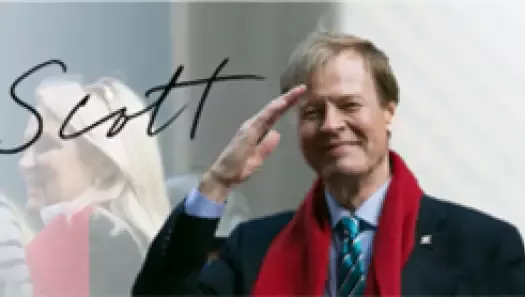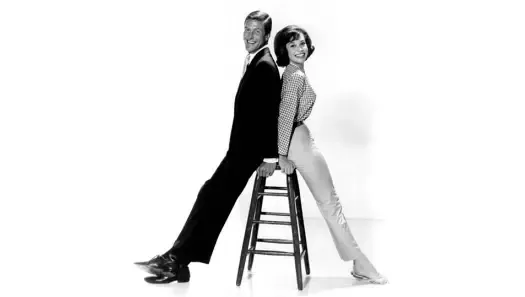HeroVet: Ned Powell, Expanding The Visibility & Mission of the USO

During wartime, many politicians offer plaudits and platitudes attesting to the courage and sacrifice of the young men and women on the front lines of freedom. Too often, though, too many of this chorus of promoters fade from sight when the shooting ceases and the time comes to assist active-duty military and provide services to returning veterans.
Edward A. Powell, Jr. is not one of these sunshine patriots.
At the helm of the USO since January 2002, this son of the South, a onetime Navy yeoman whose ancestors served in the Revolutionary War and just about every war since, seized the moment when presented with the opportunity to lead the USO. For Ned Powell, it was another way to "give something back" to the country that has given so much to his family. Powell’s leadership and the USO’s mission dovetail quite nicely.
"The United States has been blessed with civilian control of the military. This is fundamental to our democracy," Ned Powell said from his office in the Washington Navy Yard. "We want to continue to work hard to tell those on active duty that the American public cares about them. We want to convey the incredible power of ‘Thank you’ to those who serve."
This is what the USO - the United Service Organizations - has been doing for more than 62 years. In times of peace and periods of war, the USO has been on the front lines with the troops, bringing "a touch of home" to America’s military personnel.
"Let’s not get confused as we did in Vietnam," Powell said. If you’ve got a problem with U.S. policy, "don’t take your opposition out on those who serve. They’re a precious resource for all of us." What happened to those who served in the Vietnam Era, which is when Ned Powell fulfilled his two years of active duty, still rankles.
Changing Culture
Ned Powell came to the USO after a two-year stint as Assistant Secretary for Financial Management, and then Deputy Secretary, at the VA. There he was charged with managing 220,000 employees and an annual budget of some $48 billion. It was on his watch that the VA received its first-ever clean audit opinion, of which he remains quite proud. His leadership garnered him well-deserved recognition: he was awarded the department’s Exceptional Service Award and was named Distinguished Federal Executive for the year 2000 by the Association of Government Accountants.
His leadership skills, he said, were honed by his work on active duty with the Defense Intelligence Agency. Foiled in his dream to become a pilot by bad eyesight - "I can’t tell a tree from a person at 30 yards," he said - he enlisted in the Navy Reserve. Informed that the recruit who finished first in his class could choose his own duty station, Powell was determined that he would be that recruit. He was. He opted for Washington, D.C., a scant 90 miles from his home in Richmond, Virginia, and was assigned to the DIA.
It wasn’t long, however, before he became disenchanted with his work. He bristled at the level of authority under which he had to operate. One day, one of the Intelligence School’s senior faculty, Air Force Colonel Bob Lambert, called him into his office. The seasoned colonel told the young yeoman how important his job really was. "And that," said Powell, "made all the difference in the world. That incident taught me a lot about managing people."
"I learned the value of doing a job well - doing the job you have now well." His assignment also sparked a lifelong interest in intelligence work, which was ironically appropriate: His uncle, Lewis Powell - that’s former United States Supreme Court Justice Lewis Powell - served as an intelligence operative during the Second World War, his exploits the stuff of fiction yet unknown to his family.
After using his GI Bill benefits to obtain his MBA from the University of North Carolina at Chapel Hill in 1978 - he’d received his BA in economics from Washington and Lee University prior to joining the Navy - Ned Powell embarked on an entrepreneurial career. He was 31 years old when he bought his first company, a firm that manufactured wooden products; it was to be the first of several successful business ventures.
Golf Links
Beginning in 1986, Powell taught business ethics and policy at the University of Richmond and consulted with the International Center for Development on issues of the social responsibilities of management. He also trained as a moderator for the Aspen Institute. His ethical mindset embraces public service. While military service, he acknowledges, is not for everyone, public service "is not an option: It’s part of what’s required of you as a citizen," he believes. "You have a responsibility to do what you can to make your community better. It’s a two-way street: rights and responsibilities go together. You can’t be unengaged."
Ned Powell was ready to engage again, to seize the opportunity to "reconnect" to public service when a golfing buddy named Bill Clinton asked him, "What are you doing these days?" while they were on the links one day in Washington. Clinton’s inquiry sparked Powell, a lifelong Republican, into joining the Clinton Administration in October 1998.
Part of his mission at the VA was to dent if not transform at least part of the culture ingrained in both long-time administrators and short-term appointees. "I refused to attend, or to hold, meetings with more than eight or nine people," Powell said. "Just think of the personnel costs when someone calls a meeting for ten key administrators and they show up with 65 staffers. The system doesn’t need 65 note-takers," he said.
He also attempted to alter the mindset from "How much did you spend?" to "Did you achieve the outcome you had expected to achieve?" For Ned Powell, outcome is what’s important.
The outcome he hopes the USO will achieve during his tenure there is simple: "We want to work hard to reestablish the USO in the mind of the public as a factor in the success of the U.S. military. And we want those in the military to know that the public supports their sacrifice."
Sometimes it’s the small initiatives that have a huge effect. This past February, the wife of the Chairman of the Joint Chiefs of Staff, Mary Jo Myers, solicited schoolchildren to send Valentine’s cards to troops. The cards were delivered to military hospitals, such as Landstuhl, Germany, and put into baskets. The troops who were recovering from wounds and illnesses could then sort through the cards enjoying the messages of support from home.
"This makes for a very powerful connection," Ned Powell said. "And that’s what the USO is all about."
Image Credit: https://en.wikipedia.org/wiki/Edward_Angus_Powell_Jr.



